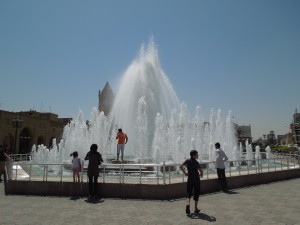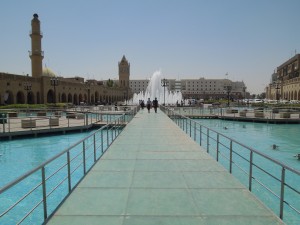 This blog entry tells a few stories about Kurdistan’s water usage. With considerable sadness, I must admit that my observations have not been particularly positive. As I strive to find my professional place in Iraq’s water security endeavors, I am daily reminded that water management is not just an environmental challenge – it’s a cultural one.
This blog entry tells a few stories about Kurdistan’s water usage. With considerable sadness, I must admit that my observations have not been particularly positive. As I strive to find my professional place in Iraq’s water security endeavors, I am daily reminded that water management is not just an environmental challenge – it’s a cultural one.
My disappointment began one ordinary evening at a party thrown by an English language professor from the American University of Iraq at Sulaymaniyah (AUIS). Most of the professors at AUIS are Americans, and as I arrived at the end of the academic year, many of them threw summer parties and invited every expat they know. I finally accepted an invitation and had a pretty good time except for one thing: two Greek guys mocked my entire professional ideology and pretty much told me that all of my efforts here are a big fat waste of time. Not cool.
These two Greek brothers struck up a conversation and told me that they work for a construction company here in Sulaymaniyah. Once they learned that I am not one of the American University’s many English language professors, they both looked at me puzzled and asked in snickering unison, “Then what are you doing here?” In an attempt to rebut the presumption that teaching English to Arabs and Kurds is the only rational reason for Americans to venture to this culturally vibrant, picturesque, and insanely hospitable place, I countered the question with a really motivated tale of my work, hopes, and dreams for Iraq’s natural environment. I started with “I work for Nature Iraq,” but I don’t think they’d ever heard of it, so I told them all about the organization’s amazing achievements and tried to shame them a little bit for not already knowing about Iraq’s first-ever environmental NGO. They appeared unashamed, but they humored me enough to ask how I got involved. They were annoying me, so I decided to lay it on pretty thick. I gave them a short dissertation on my work at Vermont Law School, finding new and innovative ways to bring water and human rights back to the indigenous Marsh Arabs of southern Iraq. Then I moved onto my work at Yale F&ES studying water management and the policy sciences, looking for a “common interest” buried deep under all of Iraq’s competing ones. Next, I told them a little about my awesomeness at the Department of State, making sure to keep it short so it sounded a little hush-hush and really important, but they were seemingly unimpressed. Finally, I circled back to Nature Iraq and told them all about how excited I am to be working on Iraq’s water management issues and helping the country move toward an era of water security.
Usually people are pretty impressed by all of this, but the Greek brothers just laughed at me (literally). When I failed to see the humor in my awesome story, they stopped. They apologized, but followed it with, “Seriously, what do you really expect to accomplish here?”
I think the offended and confused look on my face said they should go on or go away, so they continued with a story. They told me about their recent work at a construction site. The locals kept turning on a water pump and flooding the area, and the Greek brothers kept turning it off. Upon confronting the locals, they were told that they needed the water to wash the street. This was absurd and futile considering that the construction site was making more dirt every second. Even more of an issue was that the water was making the construction site a mud hole that was unsafe for the workers. The Greek brothers told the locals that they must leave the water off. The locals yielded and promised that they would only turn it on to collect drinking water. In the end, this turned out to be a lie; the locals could not help themselves from washing the street. The Greek brothers looked on as hundreds of gallons of water emptied out onto the street for no conceivable reason.
The next morning, my driver was escorting me to the Nature Iraq office when we were confronted with a city-owned street washing truck. This vehicle would be better described as a street flooding truck. Instead of spraying the street with a razor-fine wall of water as one might see in America, this truck meandered down the street pouring a deluge of water out of a large tube in its rear. The sheer volume of water created brown waves that rolled down the street, crashing up against the sides of Sulaymaniyah’s predominantly white cars and SUVs. Drivers maneuvered aggressively to avoid the street-wide mud puddles that had formed after the passing of the tide. As the washing truck rumbled on to flood more dusty streets, the now-dirty cars continued on their journeys to work or shopping, now surely planning to stop and use more water at the car wash on their way.
A few days later, my driver was driving me from the Nature Iraq office to my apartment. We turned the corner from the office and proceeded up a small hill. Water was rushing down the side of the street like a narrow creek. At the top of the hill stood a tiny old woman dressed in a black abaya holding a garden hose. She was meticulously washing her driveway and front stoop. This was not the first time I had seen this. Each day we drive I watch people hosing their property down. I turned to my driver and asked, “Why are people washing their driveways?” He answered very matter-of-factly, “We like it clean.” I tried to explain that these practices waste a tremendous amount of water and accomplish very little. He just dismissed me and said, “We like it. This is our way.” I was dumbfounded so I got a little smart-tongued. “Do you like drinking water too?” I asked. He didn’t seem to notice my attitude and simply replied, “Of course.” So I started to explain that if people keep washing the street and using water in other careless ways, then Kurdistan could run out of drinkable water in the very near future. He seemed either unconvinced or unconcerned. As we continued the drive with me sitting in frustrated silence, we passed a swamped soccer field with hoses and sprinklers strewn across it. Then we turned into my apartment complex and navigated our way through inundated flower beds with their soaker hoses busy soaking the parking lots.
A few weeks and many washed driveways later, I traveled to Erbil (Hawler in Kurdish) to see the 6,000-year-old Citadel and explore the city’s “big bazaar.” Erbil is the capital of Kurdistan and is developing at a very rapid pace. Businesses from around the world are flocking to its open space, Kurdish hospitality, and relative security. In and among the high-rise apartments, mega-malls, and big-windowed office buildings are many small parks and art installations. Nearly every median, intersection, and traffic circle features an eagle or a historic Kurdish figure towering over the cars as they pass by. Most of all, though, these parks and installations are marked by water features like manmade waterfalls and water fountains.
I found the greatest flaunting of water in a park spread out at the base of the towering Citadel, in the midst of the “big bazaar.” A border of water fountains encloses the park and separates it from the busy streets. Once you find the entrance, you traverse a giant shallow pool by way of a thick, glass bridge. The bridge leads you to the park’s center where an impressive fountain stands on three steps with two rings of animated sprayers shooting water into the air at various heights around a great geyser of liquid gold.
People flock to the fountain to catch a cool spritz of water bouncing off its cement steps. Some people climb right into it when more than a spritz is needed. Others, like me, simply come to stare at it in awe. It’s beautiful and excessive. It represents purity and wealth and progress, everything that Erbil aspires to become. But do the Kurds know how much water it’s wasting? Do they realize how much water is evaporated every single day off of that giant shallow pool? Do they know that this picturesque park tells a big fat lie about the abundance of water in this region? Even worse, do they intend it to? Does this geyser encourage its admirers to respect natural resources, or does it simply fill them with a false sense of water security? I’m sorry to say that I think it’s the latter.
I wonder, would environmental education be effective here? I think possibly, but getting educators on board with that idea actually presents yet another challenge. I experienced this challenge firsthand while attending the Iraq’s Second Sub-National Workshop for its National Biodiversity Strategy and Action Plan. One of the workshop’s main objectives was to prioritize biodiversity issues previously identified under the Convention on Biodiversity’s Aichi Targets. The room was divided into small working groups to discuss and rank the predetermined targets in order of importance to the country’s overall biodiversity mission. I joined a group of four other people, one of which was a colleague from Nature Iraq who kindly acted as my translator. The other group members were two local college professors and one town official from a neighboring governorate.
We were asked to rank the first four biodiversity issues listed on our workshop matrix. Long-story-short, issue No. 1 was “Awareness about the biodiversity values and their importance in Iraq,” which is essentially environmental education. I strongly believed that issue No. 1 ought to be ranked as our first priority. I was shocked to find out that the two educators at the table vehemently disagreed. They proffered that out number-one spot should go to an issue centered on integrating biodiversity values into Iraq’s socio-economic framework. Not terribly surprising for a developing nation that is striving to put itself back on the socio-economic map. Overwhelmingly, it seems, Iraq strives for money and status over education, even to the point where educators don’t believe in their own system anymore. I was dismayed.
Still, as they actively challenged my plug for environmental education, they listened intently to my point of view. We engaged in a heated debate that lasted for most of our time allotted for our task. They eventually came around and honestly agreed that education was key and deserved our top ranking. It was clear that we had come to an agreement, and not one that was merely a submission to my western pressure or ideals. Prior to our debate, they really didn’t understand the importance of environmental education and the power it holds for the future of Iraq. What can it mean when educators don’t put education first? I think it means that any environmental progression here will also require an extreme intervention with Iraq’s educational system.
So, as I go about my days observing the chronic misuse of water in a land of extreme dryness, social indifference, educational listlessness, and a geopolitical location with downstream vulnerability, I find it difficult to know what to do. Are the Greek brothers right to laugh at me? Knowing that culture and tradition reign supreme in the Middle East, often beyond reason, how can I truly effect change? I’m already deep into my soul searching and I haven’t come up with any clear answers other than “keep trying.”